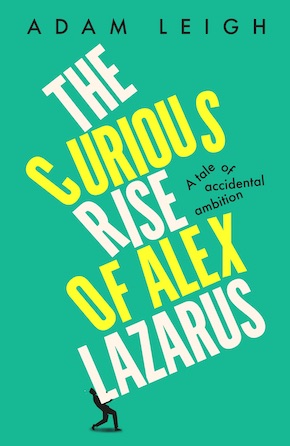The Curious Rise of Alex Lazarus and its curious evolution
by Adam Leigh
“A thrilling journey into the dark heart of start-up land.” Rory Cellan-Jones
If you had asked the eight-year-old me what I wanted to be when I grew up, I would have told you I fancied serving in the army or being an accountant like my father. Indeed, I was obsessed that he had a drinks cabinet built into his office desk, which seemed the epitome of sophistication. Of course, I had very little knowledge about the thrills of double-entry bookkeeping or VAT registration, and as for the army, I knew they had assault courses which looked fun but was oblivious to some of the harsher realities. Things of course don’t always pan out as hoped, but since I hate both spreadsheets and war, I am not really complaining.
But these were wispy flights of child fantasy. I was destined in fact to become another Jewish lawyer until some fortuitous exam results allowed me to read English at Cambridge and my life was transformed. I wrote and performed, imagining myself as the next Woody Allen (people admired him back then) or Ernest Hemingway (not sure why, as I am pusillanimous coward). What I lacked in talent I made up for in aspiration.
Instead, a thirty-year career in advertising ensued filled with long lunches and excruciatingly detailed conversations about how to promote toilet paper (softness versus absorbency) and the benefits of odour-removing detergents. These were weighty topics to our clients, although I often had to suppress the nagging doubt that in the real world no one actually cared.
Still, I was driven by a need to succeed and a desire to move up, move ahead and beat my competition. If I was good at something, I needed to do it well. In 2014 as CEO of an independent agency, I was fortunate enough to lead its sale and felt a quiet sense of achievement, even if success was courtesy of a significant NatWest contract to produce unimportant direct mail that was immediately discarded.
My wife then munificently allowed me to join her successful Executive Search firm and I pondered my future and an unfulfilled yearning to write. My first idea was a book about ambition and its origins. Was it a good thing? Where did it come from? How had it changed over time? I started researching and wrote eighty pages, covering the major religions and classical civilisation. But my other aim in life is to always be funny, and unfortunately it read like the dissertation of a would-be stand-up about to be thrown out of university for not taking the subject seriously. It wasn’t very good.
And then one day, lost in the damp reverie of a luxuriant bath, the place where I do my best thinking, I remembered an earlier moment of ambition that never came to fruition that inspired me to consider a fictional approach.
We alighted on the concept of fabparent.com, which was going to be a global marketplace of solutions for overstressed parents. Our second children were born and the imaginary start-up wound down.”
On a hot summer’s day in 1999, a friend and I were loosely supervising our two-year-old children in the playground in Queen’s Park as our heavily pregnant wives relaxed in an adjacent cafe. He was a rising star at M&S, and I was forging ahead with my advertising career. Mindful of the exploding dotcom revolution, we brainstormed our future millions and alighted on the concept of fabparent.com, which was going to be a global marketplace of solutions for overstressed parents. Over the following few weeks, we met up and hatched ideas for a business plan to precipitate a digital parenting revolution. However, our second children were born and we were engulfed by practical childcare responsibilities. The imaginary start-up wound down; he was put in charge of a sizeable dotcom investment fund for M&S, and I got a decent pay rise when I moved to another agency.
For years we always joked about ‘what if’ and imagined a different reality. In the bath again at the end of 2018, I wondered what success might have looked like had we had the confidence to take such a risky step, and the germ of a business idea became the inspiration for The Curious Rise of Alex Lazarus.
The lead character is not me. He has my initials, and my father’s family name was originally Lazarus (as a young Jewish man in post-war Britain, he anglicised it to ‘Leigh’ thinking this would bring him more success in the commercial world), but Alex has more drive and determination than I had in my career, and is prepared to make more sacrifices.
I wanted to be accurate in my description of a fledgling start-up, and following advice from a major tech investor, even wrote a fictious Wikipedia entry which outlined the growth of my imaginary business. Two books made me realise that I could however take more liberties – Brad Stone’s The Upstarts (Bantam Press, 2017) and John Carreyrou’s Bad Blood (Picador, 2018). The former charts the rise of Airbnb and Uber, whilst the latter is the astonishing tale of Elizabeth Holmes and the Theranos scandal. They both proved that ambition can often be driven by luck, unrelenting drive, and a flexible vision aligned to questionable morality. These bonkers start-up stories liberated me to create my own unlikely narrative.
My book is about the pursuit of more and the impact it can have on individuals, good or bad. Its original title was The Unicorn Ride, referencing the concept of ‘Unicorn’ status – a term coined in Silicon Valley in 2013 for a start-up with a valuation of over $1billion. I changed it to The Curious Rise of Alex Lazarus because it seemed a more accurate reflection of the accidental nature of success.
What I have also uncovered is a real determination to ensure that my writing is as successful as possible. For the last three months, I have utilised my marketing experience, creative contacts and professional network to drive awareness of its launch. I have pulled in more favours than Bob Geldof for Live Aid, and bludgeoned anyone I can with messages of its imminent appearance.
The book hopefully captures the excitement and frenetic ebullience of a dynamic business with a determination to prosper irrespective of the dubious morality needed to fuel its growth. Its writing allowed me to channel my own experience of these comical and questionable behaviours into what I also hope is an examination of what you may need to sacrifice if you want the immortality of success.
I know now that I want to write much more. I want to find more forums to debate my thoughts and my observations. I want to engage in an ongoing dialogue with anyone I can persuade to read the book. And I want to get a few more laughs along the way. On reflection, I am extraordinarily glad that I gave up with the first book. After all, you try writing jokes about the nature of ambition in ancient Greece.
 Adam Leigh graduated with an English degree from Cambridge and joined Ogilvy & Mather, rising to become their youngest board director. During a thirty-year advertising career, he ran a number of firms, eventually becoming a partner in an independent agency. He now runs an Executive Search consultancy working with some of the world’s leading creative and media businesses. The Curious Rise of Alex Lazarus, his first book, is out now from Whitefox Publishing.
Adam Leigh graduated with an English degree from Cambridge and joined Ogilvy & Mather, rising to become their youngest board director. During a thirty-year advertising career, he ran a number of firms, eventually becoming a partner in an independent agency. He now runs an Executive Search consultancy working with some of the world’s leading creative and media businesses. The Curious Rise of Alex Lazarus, his first book, is out now from Whitefox Publishing.
Read more and buy from amazon
adamleighwriter
@adamleigh26
@wearewhitefox


